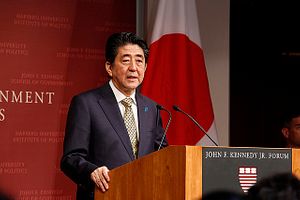In the mid-1930s, Japanese General and Minister of War Sadao Araki said “[i]t is Japan’s mission to be supreme in Asia, the South Seas and eventually the four corners of the world.” Japan’s imperial expansion ended with the country’s official surrender aboard the USS Missouri in Tokyo Bay in 1945. Replacing its Meiji Constitution with a new pacifistic one, Japan embarked on an unprecedented era of democracy, peace, and economic prosperity.
Now, on the eve of the 70th anniversary of the end of World War II, the Japanese House of Representatives’ adoption of new security bills may signal an end to the country’s pacifism. The legislation, pushed through by Prime Minister Shinzo Abe and his ruling Liberal Democratic Party (LDP), revises the current law allowing Japan’s military to mobilize overseas if:
1. Japan or a close ally is attacked, and the result threatens Japan’s survival and poses a clear danger to its people.
2. There is no other appropriate means available to repel an attack and ensure Japan’s survival and protect its people.
It further states “any use of force is restricted to a necessary minimum.”
In the midst of angry protests, Abe defended the bills creating a more muscular military, saying they “are not for engaging in wars” but are a deterrent to “prevent war.” He has argued that the bills will allow Japan to better defend its allies under the United Nation’s collective self-defense doctrine, which allows for “individual or collective self-defense if an armed attack occurs.” But he has failed to explain why Japan’s supporting role in UN peacekeeping, as one illustration, has been insufficient for the country to be viewed as making major contributions to preventing war.
Domestic opponents of the legislation, who include more than 10,000 scholars, insist the bills are unconstitutional. Article 9 of the Japanese Constitution is clear: “the Japanese people forever renounce war as a sovereign right of the nation and the threat or use of force as means of settling international disputes . . . land, sea, and air forces, as well as other war potential, will never be maintained.” Furthermore, Article 96 dictates that amendments to the Constitution must pass a two-thirds majority in each house before being ratified by a majority of the people, a process that Abe knows would surely fail as 61 percent of the Japanese public oppose the changes that he is making.
In addition, serious concerns have also been raised about the vagueness of the adopted provisions, which opponents argue would give the current and future government too much leeway to interpret when and where troops might be deployed in an offensive capacity. Given Japan’s history, there is wisdom in the views of the Japanese public.
The last time Japan deployed its military on foreign soil, it seized, annexed, and invaded its way across southeast Asia, acquiring natural resources and great wealth. The Japanese military, under the direction of the government, murdered between three and ten million Chinese, Indonesians, Koreans, Filipinos, and Indochinese. It committed human-rights atrocities across the entire Asian theater, including the sexual slavery of tens to hundreds of thousands of women, and the indescribable horrors of Unit 731 in Harbin, Manchukuo, where Japanese scientists conducted dissections and other unspeakable experiments on live prisoners. These atrocities are well documented, yet, unlike Germany, which has worked to learn from and make recompense for the sins of its past, the modern Japanese government refuses to admit to, apologize for, teach, or learn from these events.
It is especially disconcerting for Abe and the LDP to push for these changes because of their long history trying to downplay Japanese war crimes. In a 1995 resolution in the House of Representatives, 221 members of the LDP party emphasized “the Pacific War was a war to liberate colonized Asia.” Justice Minister Nagano Shigeto famously claimed “the Nanjing Massacre is a fabrication,” before being forced to resign. And in referring to a 2007 U.S. resolution seeking an apology from Tokyo for the World War II rape and sexual enslavement of hundreds of thousands of women, Ryozo Kato, Japan’s then ambassador to the U.S. stated, “it is harmful for Japan-U.S. relations if a factually unfounded resolution is passed.” In 2007, Abe claimed that “comfort women” were “not coerced” into becoming sexual slaves of the Japanese Imperial Army. Earlier this year, in his press conference with U.S. President Barack Obama, the prime minister sidestepped apologizing for the use of comfort women, merely saying he was “deeply pained” about their suffering.
In the midst of the huge public outcry, the legislation now moves to Japan’s House of Councillors, which has been described as the “seat of common sense” and the arena for the “politics of reason” because members serve six-year terms. Although the LDP coalition has a majority in the Diet’s Upper House also, there is a precedent for the House of Councilors to reject legislation from a prime minister of its majority party. Back in 2005, rebels from the LDP majority joined the opposition to vote against postal privatization. Then Prime Minister Junichiro Koizumi called snap elections after expelling the rebel LDP members from the party and in that case scored a huge electoral victory.
This, however, is a dramatically different situation. Even if Abe holds together his coalition and prevails in the House of Councillors, he could be damaged politically, or have the law later declared unconstitutional by Japan’s Supreme Court. It remains to be seen if LDP unity can hold in light of the strong public reaction against what is widely viewed as a political and anti-democratic decision. The best thing the prime minister could do now is to yield to the wisdom of the people of Japan.
Jared Genser is an Associate of the Carr Center for Human Rights Policy at Harvard University and a columnist with The Diplomat. Michelle Brignone is a law student at Georgetown University Law Center.

































